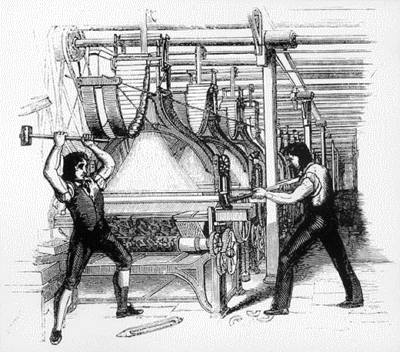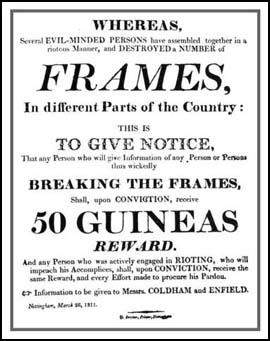 SKC Films Library SKC Films Library |
|
|
| SKC Films Library >> General and Old
World History >> Great Britain >> England >> George III, 1760-1820 |
 Luddites Ludditesrebels against industrialization From early 1811 until early 1813, during the turning point of the Napoleonic Wars, three regions of England were disturbed by a series of industrial riots involving the destruction of machinery: the Midland hosiery and lace-making districts of Leicestershire, Derbyshire and Nottinhamshire; the West Riding of Yorkshire; and the cotton areas of Lancashire and Cheshire. It eventually became necessary to employ a force of 12,000 soldiers to suppress the riots. Some thirty years earlier, Ned Lud, a laborer from Leicestershire, had smashed two lace frames belonging to his employer and in the process gave a name -- "Luddism" -- to the whole phenomenon. The anger of the rioters vented
itself largely against textile machinery of various
kinds. For that reason it was generally assumed that the
immediate cause of the riots was the introduction of new
labor-saving machinery into the affected industries. This
view is a far too simple one of a complex situation. Only
to a limited extent did the riots of 1812 have as their
main objective the destruction of labor-saving machinery,
for such labor-saving machinery was not new. The
immediate causes of the disturbances were the high price
of foodstuffs, the collapse of the British export trade
to the United States after February, 1811, and the
effects of Napoleon's Continental System, which aimed at
the exclusion of British goods from Europe.
In the early months of 1811 the first threatening letters from "General Ned Ludd" and the "Army of Redressers" were sent to employers in Nottingham. By March 1811 several attacks were taking place every night and the Nottingham authorities had to hire four hundred special constables to protect the factories. To help catch the Luddites, the Prince Regent offered £50 to anyone "giving information on any person or persons wickedly breaking the frames." In February and March 1812, Luddites attacked factories in Huddersfield, Halifax, Wakefield and Leeds. In February 1812, the government of Spencer Perceval proposed that machine-breaking should become a capital offense. Parliament subsequently passed the Frame Breaking Act, which did indeed make machine-breaking a crime punishable by death. The government then ordered 12,000 troops into the areas where the Luddites were active. On March 20, 1812, the warehouse of William Radcliffe, one of the first manufacturers to use the power-loom, was attacked in Stockport. On April 11, 1812, a group of 150 Luddites attempted to destroy the cloth-finishing machinery at Rawfolds Mill, in Huddersfield. William Cartwright, the mill owner, had hired armed guards, however. The Luddites failed to gain entry, and two of them were mortally wounded in the attempt. On April 18, 1812, another group of Luddites killed William Horsfall, another Huddersfield-area mill owner. Following the above two attacks, authorities succeeded in rounding up over a hundred suspects. Of these, sixty-four were indicted. Three men were ultimately executed for the murder of Horsfall, and another fourteen were hung for the attack on Rawfolds Mill. On April 20, 1812, several thousand men attacked Burton's Mill at Middleton, near Manchester. Emanuel Burton, the mill owner, had recruited armed guards to protect his mill, however, and three members of the crowd were killed by musket fire. The men returned the next day and, after failing to break in to the mill, burned Burton's house down. The military arrived and another seven men were killed. On April 24, 1812, Wray & Duncroff's Mill at Westhoughton, near Manchester, was set on fire. Twelve men suspected of taking part in the attack were ultimately arrested, four of whom were subsequently hanged. In June 1812 John Knight organized a meeting for weavers at a public house in Manchester. Local authorities raided the meeting and arrested Knight and thirty-seven other weavers. All thirty-eight men were tried on charges of attending a seditious meeting, but all were acquitted. In the summer of 1812 eight men in Lancashire were sentenced to death and another thirteen were sent to the penal colony at Australia for attacks on cotton mills; another fifteen were executed at York. By 1817 the Luddite movement had ceased to be active in Britain.
PRINT SOURCE INTERNET SOURCE SEE ALSO |
SKC Films Library >> General and Old World History >> Great Britain >> England >> George III, 1760-1820 This page was last updated on March 22, 2017. |
 General
Outline of Events
General
Outline of Events